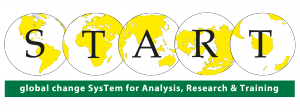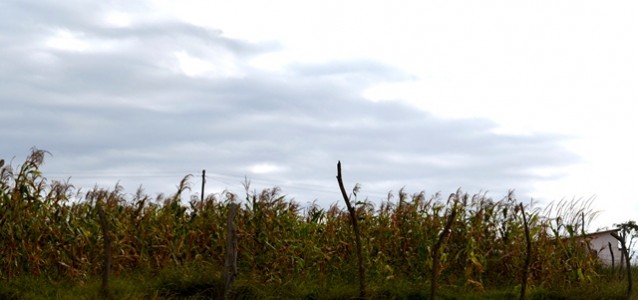The Climate System Analysis Group (University of Cape Town) has been in a collaboration with the University of Zimbabwe for the project ‘’ Assessing adaptation capacity of crop management strategies for small holder farmers in Zimbabwe’’. Lead investigators of the project include Teddious Mhizha (University of Zimbabwe) and Olivier Crespo (CSAG), with co-investigators, Nkulumo Zinyengere (CSAG), Emmanuel Mashonjowa (University of Zimbabwe), and Sepo Hachigonta (FANRPAN). The project is funded by START through their Grants for Global Environmental Change Research initiative.
Agriculture and food production are under the pressure of climate change. In Africa, and in southern Africa, the agricultural systems are highly vulnerable to those changes, and there is a need for a better understanding of the impacts and adaptation alternatives. The common small holder farming systems require study at the community scale, hence the initiation of this project.
This study has aimed to expand the understanding of the vulnerability of Zimbabwe’s food production systems as a result of climate change. The goal is to improve the adaptation skills of small holder farmers by identifying potentially effective management adaptation options. The research conducted aims to: 1) assess the agricultural potential of maize in Zimbabwe under future climate scenarios; 2) identify optimal management options by evaluating the utility of current and alternative management strategies under a changing climate, and 3) communicate the achieved results by engaging with the relevant stakeholders.
Climate scenarios will be downscaled from selected global circulation models (GCMs) out of a set of 10, using the 4.5 and 8.5 representative concentration pathways (RCPs) for a baseline period of 1980-2010, and 2 or 3 future periods; 2010-2040, 2040-2070, 2070-2100. The downscaled climate scenarios will be used to drive a crop model (DSSAT) to simulate common and innovative smallholder crop management options under current and future climates. This approach will be used for maize cropping systems. The study will be carried out at the district scale in Mutoko.
This project has ties with AgMIP and FANRPAN projects in Zimbabwe, which will facilitate access to existing data and stakeholders. The project team will engage the Mutoko farming community and other relevant stakeholders through consultative, evaluation and dissemination meetings to develop and communicate key messages from the results of the study. There is strong focus on capacity building in Zimbabwe through a formal collaborative team linking the University of Zimbabwe (UZ) with the expertise and facilities at the Climate System Analysis Group (CSAG) at the University of Cape Town (UCT), along with various training for UZ researchers. Outreach to stakeholders and farmers in Zimbabwe will be completed during the latter months of the project.
Significant progress has been made in the 1st half of the project especially regarding capacity development towards the UZ team. All planned capacity development activities have been achieved so far. The project has displayed hopeful results and improved our understanding of the vulnerability of food production systems in Zimbabwe to climate change. Further study will help improve the adaptation of small holder farmers through identifying potentially effective management adaptation options. The final report is expected to be completed by March 2014.
For more information with regards to this project contact Olivier Crespo of the Climate System Analysis Group.


Ulrik Pedersen
Dear Sir/Madam
I would like to get in contact to Olivier Crespo about the project “Assessing adaptation capacity of crop management strategies for small holder farmers in Zimbabwe”.
I am working with climate change vector borne disease in Zimbabwe and we might have common interests.
Hope for a positive response.
Kind regards,
Ulrik Pedersen
Ulrik Pedersen
PhD fellow, MSc
Parasitology, Health and Development
Faculty of Health and Medical Sciences
University Of Copenhagen
Thorvaldsensvej 57, Dk 1871, Frederiksberg
Denmark
DIR +45 2962 2186
Cell +45 3122 3866
ubop@sund.ku.dk
http://www.ivs.life.ku.dk